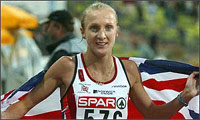 British Coaches discussion with Mike Winch by Paul Grech
British Coaches discussion with Mike Winch by Paul Grech
With the obvious exception of America, no nation has produced as many world class track athletes as Britain. Yet, the athletic structure in the United Kingdom – despite the setting up of UK Athletics – remains largely amateurish. Almost everyone involved depends on other jobs and athletics is simply a hobby, albeit a particularly demanding (not to mention expensive) one.
And that includes the coaches.
Which is hardly the ideal set-up, not only for the development of athletes but also for the coaches themselves. The vast majority of British coaches struggle to find time they can actually dedicate to the athletes. They learn mainly through experience – repeating errors made by others in the process – with no formal structure that actively supports them.
It is a state of affairs that annoyed Mike Winch. But, unlike many others, he was determined to do something about it. Which is what last year made him to set up the Athletics Coaches’ Association of the United Kingdom with the aim of providing that structure that had been missing all along.
It was something that he had been thinking of for quite some time. “More than twenty years ago, I started listening to Ron Murray who was talking about the need for a professional structure for athletics coaches. It was his contention that the best coaches were only able to work at their sport in leisure hours because they could not get full time payment within the sport.”
Murray’s arguments left an impression, so much that Winch made an initial try to set something up. “I therefore made an attempt to start an association but was stopped by Frank Dick who promised to set up an official association within the sport. This, of course, never happened but it did stop the fledgling new association in its tracks.”
“More recently I have travelled as a coach to many major Games and had the opportunity to discuss with my colleagues the way things have been going with UKA in charge. Generally, we all concurred that nothing had changed and our situation had actually deteriorated with the new “potential schemes” and “WCPP” being manipulated to work against active and good coaches who were already in place.”
More determined than ever he, along with a group of others, decided to forge ahead with their idea. Attempts to involve UK Athletics weren’t as successful as they would have wished for but, at last, the basis for an association is now in place. “At the end of 2002 we decided that we must start it on our own which is what we did in January 2003. Myself, Sir Eddie Kulukundis, Peter Sutcliffe, Judy Oakes, Darrell Bunn, and Jock Anderson were the prime movers. We created a constitution, a mission statement, aims and objectives and web-site and gave ourselves a year to create the basic structure and start pulling in members. This has all been done and with considerable publicity we are now on our way.”
Justifiably, there is more than a hint of satisfaction as he lists the achievements of the fledgling association. “I am delighted with the response and results,” he says. “We send a questionnaire to each new member and have very interested in the returns. They indicate very clearly that coaches need better communication with UKA, better and more technical courses, links with other coaches and to benefit from senior coaches expertise.” Clearly, there were many that felt the need for this association.
Slowly, interest is building up. “We have members from all over the country and are moving steadily towards the hundred members mark. It is interesting to hear that there are supposedly 4000 plus coaches in the UK, but the real test is how many of these actually coach. We would be looking for a membership of hundreds rather than thousands in the long run.”
Reaching that target is probably the biggest challenge facing ACAUK and also the best way that it has of meeting its objectives. Which include the dissemination of information among coaches. An interesting objective, one that raises the question of what is the current practise. Again, Winch is grating in his opinion. “Simple. Divide and rule. Keep every coach isolated and he or she will not be able criticise with any effect. Now that coaches will be able to speak with a strong voice both with UKA and each other information and ideas will start to flow. We have already linked into Brian McKenzie’s Sports Coach web-site as an official resource provider, and we also have set up two coaches course with BACT later in the year to start the ball rolling with event specific and strength and conditioning for coaches.”
He is equally adamant that, irrespective of the competitive nature in athletics, coaches will pull together and share their knowledge. “Most coaches realise that their success is largely down to personal skills. The techniques of coaching can be disseminated without danger of anyone acting in your worst interests. Most coaches are only too happy to help each other and in fact would like to be listened to about any ideas they might like to present.”
The fledgling association’s relationship with UK Athletics, however, is something of a sore point. This is also reflected in another of ACAUK’s objective, that of presenting a unified voice. “It is my fond belief that the best people to establish policy for coaching are coaches. They know what is best for the development of coaches and what priorities should be established. Individual coaches might be wayward or extreme but by seeking a consensus view of coaches and putting this forward we shall have the best way of progressing not only coaching as a skill but the coaching of athletes and their development as well.”
“There is no doubt that changes need to be made and I am sure that we shall be able to put forward the views of our members at the highest level and create an atmosphere of progress towards both professional coaching and a professional coaching structure. We have the skills but not the structure to help and educate our best coaches.”
“I have not had any negative comments from coaches but salaried UKA coaches are a bit conspicuous by their absence,” he says. “This is understandable since I would suspect they are either OK so don’t care or are a bit frightened that we might expose the failing system and therefore jeopardise their jobs.”
Regardless, Winch maintains that he is still interested in involving Britain’s governing athletics body. “I have never had problems with UKA. I maybe disagree with what they are doing but have not had a problem with talking to them except for the performance section who currently seem to be sitting in an ivory tower fending off all criticism without stoic silence and inaction.”
“Adam Walker and Maggie Still have always been communicative and we are currently starting a dialogue with them in several fields.”
Hopefully, such dialogue will provide some answers for the many problems that British coaches face. Winch is realistic about the current situation. “Ask yourself how many coaches of note who consistently start (British) athletes off at the beginning and take them through to international level in each event, there are. You don’t come up with many names.” As with any other rhetorical question, this one hardly needs an answer.
Or, rather, the best answer is provided by the host of British athletes who constantly turn to foreign coaches in order to fulfil their potential. And the systematic chorus of disapproval every time this happens, quickly dies down without much being done to change the situation.
“It is a slap in the face but you will find that many of these foreign coaches are professional,” he admits. “Athletes in the UK cannot make a choice of UK coaches because the majority of good ones are unpaid and cannot put 100% of their time into an athlete. Take Mike McFarlane as an example. He has lost a number of his top athletes to America and full time coaching. Mike could not do this as he has a wife and family and needs to earn his money outside the sport as athletics cannot offer him enough. One great coach who has lost out because of our archaic system. There are a number of others, but until we can finance coaches properly and not just those who for a short time are associated with top athletes, “the poachers”, then we will always see athletes voting with their feet and linking into full time foreign coaches.”
It is such problems that ACAUK seeks to address. “We need to focus the sport’s mind on how it is run; its strengths and weaknesses. We have a fantastic club structure and background, so why not focus on this rather than creating a separate and arguably useless system that is operating against our historic strengths. resource the clubs to employ coaches, resource talent id in schools and direct new talent to clubs, and the whole system will start working again.”
Whether this will be achieved remains to be seen. Nevertheless, the mere existence of such an association is a step forward. Yet there is still a long way to go.
Asked where he would like the association to be in fifteen years, Winch is initially uncertain – “that is not for me to say” – but then goes on to list his hopes, claiming that he wishes “that it will be as good a structure as the Australian Coaches Association which effectively controls coaching in that Country. Hopefully we will have professional coaches paid on the basis of merit rather than patronage, a club system fully resourced to progress young athletes to the highest level and top level coaches who are not excluded because they have different ideas to the governing body.”
The future of top level athletics – and athletes – hailing from Britain could well depend on these hopes coming through.
More information about the Athletics’ Coaches Association of the United Kingdom can be found at www.acauk.co.uk





















